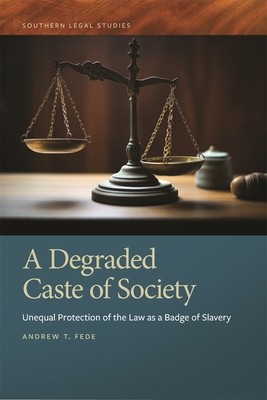
- We will send in 10–14 business days.
- Author: Andrew T Fede
- Publisher: University of Georgia Press
- ISBN-10: 0820366293
- ISBN-13: 9780820366296
- Format: 15.2 x 22.9 x 2.1 cm, kieti viršeliai
- Language: English
- SAVE -10% with code: EXTRA
Reviews
Description
A Degraded Caste of Society traces the origins of twenty-first-century cases of interracial violence, such as the February 2020 murder of Ahmaud Arbery, to the separate and unequal protection principles of the criminal law of enslavement in the southern United States. These principles, which were extended by antebellum appellate court opinions and statutes to the South's free Black population, consigned Black people to what South Carolina justice John Belton O'Neall called a "degraded caste of society." Under these statutes and court decisions, O'Neall contended that free Blacks were "in no respect, on a perfect equality with the white man."
This positive written law privileged and legitimized private white interracial violence, which became a badge of slavery that influenced the law in action even after the Constitution mandated the enforcement of the equal protection of the criminal law. The U.S. Supreme Court enabled this denial of equal justice, as did Congress, which did not make all private white racially motivated violence a crime until 2009, when it adopted the Matthew Shepard and James Byrd Jr. Hate Crimes Prevention Act. Andrew T. Fede's historical analysis supports that law's constitutionality, while suggesting why--during the Jim Crow era and beyond--the promise of equal protection of the criminal law was not realized. First, this book analyzes the evolution of legal doctrines in statutes and appellate court decisions, combined with other historical evidence, including newspapers and trial court and census records, to create comprehensive contexts for a more complete understanding of the positive law sources examined. Second, Fede reveals the origins and development of the separate and unequal protection doctrine. Third, the book demonstrates why this legal history provides an essential context for an understanding of the continuing curse of interracial violence in the United States as a lingering and deadly badge of slavery, which Congress has the authority to criminalize under its Thirteenth Amendment enforcement power.EXTRA 10 % discount with code: EXTRA
The promotion ends in 21d.04:56:20
The discount code is valid when purchasing from 10 €. Discounts do not stack.
- Author: Andrew T Fede
- Publisher: University of Georgia Press
- ISBN-10: 0820366293
- ISBN-13: 9780820366296
- Format: 15.2 x 22.9 x 2.1 cm, kieti viršeliai
- Language: English English
A Degraded Caste of Society traces the origins of twenty-first-century cases of interracial violence, such as the February 2020 murder of Ahmaud Arbery, to the separate and unequal protection principles of the criminal law of enslavement in the southern United States. These principles, which were extended by antebellum appellate court opinions and statutes to the South's free Black population, consigned Black people to what South Carolina justice John Belton O'Neall called a "degraded caste of society." Under these statutes and court decisions, O'Neall contended that free Blacks were "in no respect, on a perfect equality with the white man."
This positive written law privileged and legitimized private white interracial violence, which became a badge of slavery that influenced the law in action even after the Constitution mandated the enforcement of the equal protection of the criminal law. The U.S. Supreme Court enabled this denial of equal justice, as did Congress, which did not make all private white racially motivated violence a crime until 2009, when it adopted the Matthew Shepard and James Byrd Jr. Hate Crimes Prevention Act. Andrew T. Fede's historical analysis supports that law's constitutionality, while suggesting why--during the Jim Crow era and beyond--the promise of equal protection of the criminal law was not realized. First, this book analyzes the evolution of legal doctrines in statutes and appellate court decisions, combined with other historical evidence, including newspapers and trial court and census records, to create comprehensive contexts for a more complete understanding of the positive law sources examined. Second, Fede reveals the origins and development of the separate and unequal protection doctrine. Third, the book demonstrates why this legal history provides an essential context for an understanding of the continuing curse of interracial violence in the United States as a lingering and deadly badge of slavery, which Congress has the authority to criminalize under its Thirteenth Amendment enforcement power.

Reviews